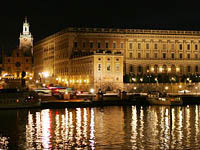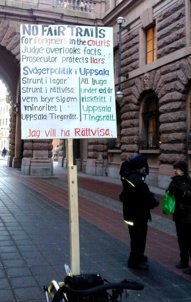Living in brave new Sweden, recalling the 1930s
By Ritt Goldstein

Throughout much of Europe, economic reforms have brought human hardship, many blaming such hardship on other than the political leadership whose decisions brought it. Reports by the Swedish government have revealed pervasive 'structural discrimination' against both those of foreign origins and other minorities, discrimination from official sources posing a particularly difficult threat. Of course, history demonstrates too well what may occur when xenophobia enters the official structures of a state, the worst kinds of discriminatory acts finding a seldom questioned legitimacy.
FALUN, Sweden - There are no gas chambers or concentration camps here, though a Falun politician, Daniel Riazat of the Left Party, did make March headlines when he charged that what's ongoing in Sweden can be compared with "politics in Nazi Germany". Perhaps more telling, he was not without supporters for his statement.
Norway's ongoing Breivik trial emphasizes a disturbing perspective some today have. The fact that Sweden's Expressen reported Breivik formed a "large part of his political opinions" (translated) here, does serve to underscore some unsettling changes. That's further emphasized by the fact that on 14 May Swedish prosecutors began the trial of a 40 year old man charged with three murders and the random shooting of immigrants, a dozen being shot in the southern city of Malmö. These attacks were also recently saluted by Breivik.
Helping to cultivate nightmarish changes here, the increasing impact of what might be termed Swedish 'Social Darwinism' has been substantive. Many Swedes are unquestionably experiencing socioeconomic pain, Swedish xenophobia seeming to explode with the 'economic reforms' of recent years. And, perhaps this can be seen as part of a wider pattern.
Providing a notable parallel to Sweden's rightward drift, in late April Reuters reported Francois Hollande, France's newly elected president, describing the roots of his nation's far-right leanings as "economic despair among 'a suffering electorate'". The fact of 'austerity' stricken Greece's neo-Nazis winning about 7% of the vote in its election, rising from the .23% they had received in the previous vote, does make a further statement. Of course, if one ties the development of far-right feelings to economic privation, it would seem there's ample room to argue that a 'poison fruit' has grown from the branches of economic reform, and in Sweden 'the reforms' have proved particularly noteworthy.
Turning social democracy into a museum-piece
Like much of the West, Sweden has embraced neoliberalism, but done so with extraordinary speed. Only this March, the US's conservative Heritage Foundation happily intoned that Sweden has privatized and deregulated itself faster than any other advanced economy on the planet. And as the right wing US magazine American Spectator gleefully reported in September, "Sweden has been quietly turning social democracy into a museum-piece".
For many in Sweden, the changes have not been cause for celebration - they have only been quick and painful. This once egalitarian country now has "the steepest increase in inequality over 15 years amongst the 34 OECD nations", Reuters reported in March, adding that the financial gap between Swedes is "rising at four times the pace of the United States".
For tourists coming to Stockholm, a new bus to take is one which offers the so-called 'class war safari', affording visitors a view of the truly 'New Sweden', a Sweden increasingly of the rich and the poor.
Tax-reforms substantively aiding the wealthy and business (ie, Sweden ended inheritance taxes in 2005), plus 'corporate welfare', have effectively meant devastating cuts to social programs. But many Swedes mistakenly turn their wrath upon societal minorities instead of the political leadership responsible for present policies, immigrants being a particular target, but not the only one.
The blue-yellow glass house
A 2005 governmental report on the widespread structural discrimination here, "Det blågula glashuset" (The blue-yellow glass house), observed that 'blaming the victim' is common, as is 'widespread denial' of the xenophobic prejudices feeding such conduct. Providing an indicator of the consequences, in August The Local (a leading English-language Swedish news outlet) reported that the "number of xenophobic web sites have almost doubled since 2007 and Jews and Muslims wearing apparent religious symbols are subjected to significant discrimination in Sweden today". The article added that when "American research centre Pew recently investigated the development of religious conflicts and oppression worldwide between 2006 and 2009, Sweden distinguished itself as a country where hostilities related to religion are increasing the most."
Addressing Swedish Anti-Semitism, in late April Swedish media widely reported that the chief of the Obama Administration's Office to Monitor and Combat Anti-Semitism, Hannah Rosenthal, had met with Malmö mayor Ilmar Reepalu (Social Democrat), with the fact of such a meeting being a statement in itself. Emphasizing the nature of this encounter, repeated statements by Reepalu have been characterized as "Anti-Semitic".
Sweden's Dagen quoted Rosenthal as summing up her Reepalu meeting with the words, "His (Ilmar Reepalu's) use of language is unacceptable." Media also widely reported that Sweden's Integration Minister charged Reepalu has made "recurring ignorant and bigoted statements".
Further highlighting Sweden's increasingly harsh environment, the titles of two articles provide glaring statement upon the living conditions some face here, the levels of societal 'inclusion' currently in play.
A newspaper from Southeast Sweden, Barometern-OT, headlined this February "Vi är inte djur, vi är människor" (We are not animals, we are people). And in January 2011 Svenska Dagbladet (SvD), Sweden's leading conservative paper, headlined, "Vi bor sämre än djur här" ("We live worse than animals here"), a title describing housing circumstances even I now experience.
The SvD article also observed that the tenants were "afraid" to complain. And in Falun, where I write this, I personally have found that such complaints do virtually nothing to provide redress, but instead result in ones circumstances becoming ever more severe.
In an admission that surprises even me, it's apparent that this journalist's own life is actually in jeopardy. Providing an added indicator of the current environment, I have reported three incidents of severe vandalism at my home to police.
To be clear, many of the issues I've personally observed seem to originate with both official misconduct and the xenophobia that's long existed, but has explosively grown. Structural discrimination by Swedish authorities and courts was documented by "Det blågula glashuset" and later reports, with it perhaps being the worst aspect of the problem here, and arguably its most dangerous.
Local threats, Central Government passivity
In 2010, an article from The Guardian was titled "The new Swedish xenophobia", its Swedish author forecasting xenophobia would "gain new strength, new strongholds, new legitimacy." For obvious reasons, should xenophobia take root within a state's official structures, the outcome for those not of 'majority heritage' is devastating.
In 2008, the Swedish National Council for Crime Prevention (Brå) did a report titled "Diskriminering i rättsprocessen" (Discrimination in legal proceedings), its subtitle being "On the disadvantages suffered by individuals of foreign origins (translated)". The report details Justice System discrimination based upon foreign origins or minority community membership, and for the same reasons that a party with neo-Nazi roots was elected to Sweden's parliament in 2010, the Sweden Democrats, already disturbing circumstances have only appeared to deteriorate significantly further.
To my eyes, the most severe threats one faces come not from Sweden Democrats or neo-Nazis, but rather from official actions undertaken by local Swedish authorities. Meanwhile, the central government seems to typically adopt a posture of passivity towards this, including as regards the enforcement of laws precluding such acts.

11 January 2012 photo of protest against court discrimination in front of Sweden's Parliament. The Swedish portions of the sign read: Cronyism in Uppsala. Nonsense in law; Nonsense in justice; Who cares about minorities in Uppsala District Court; To lie under oath is risk free in Uppsala District Court. I will have Justice. While some of the picket sign's English-language words are misspelled, the Swedish is entirely correct. Photo by 'A Concerned Swede'
There has come to be a perceived acceptability many seem to feel in viewing foreigners and minorities as a 'lesser species', as essentially what Nazi Germany had termed 'subhuman', indeed lending a perverse sense of legitimacy to whatever abuse misguided individuals are inclined towards. Perhaps worse still, it often seems that the more blatant and severe abuse becomes, the more likely it is to be widely accepted instead of challenged, with fear likely playing a role in this. But, there are yet Swedes of the sort that there are no people better, and one can but hope that the truths you are reading will become sufficiently evident for many to both awaken and act.
Two headlines over the last year here serve to highlight ongoing events, both appearing in The Local. The first was "Swedish society forcing 'immigrants' to emigrate", the second being "Most Swedish emigrants ever in 2011: report".
Being Jewish and having lost the European side of my family in the Holocaust, I have often considered how such horror could occur. Germany of that time was not a nation populated solely by madmen and monsters, so how could such a nightmare become real? Watching ongoing events in Sweden, I believe I have come to appreciate how the German people could let the horror of Nazism rise, and my belief is that a gradual 'normalization' of unspeakable acts can occur, 'blaming the victims' and 'widespread denial' obscuring the reality of increasingly nightmarish conduct.
It would seem that many individuals are capable of developing a particularly disturbing flaw, one leaving them unable to grasp horror committed by state structures until and unless it personally affects them, an unconscious fear of the potential consequences of facing such conduct seeming to aid in the widespread denial of wrongdoing. Of course, given the purely emotional basis for such denial, any evidence that reality provides is simply discounted.
Again, as I write this I find my own life in jeopardy. And while I believe I indeed understand what is occurring, it remains startling how so many here are aware of the circumstances I'm enduring, but yet simply seem to accept it as a normal part of local life. What had once been unthinkable perversely becoming 'normalized'.
When I first came to Sweden, to Falun, it was fifteen years ago, and I truly found it 'the closest place on earth to heaven'. Today, my feelings are obviously quite different, events of the last years being genuinely impossible to even conceive of in earlier times.
The 2010 Guardian article ends by observing that the "Sweden you know has now changed forever" ... the question now being what it's become.
Ritt Goldstein
Copyright May 2012
All Rights Reserved
Ritt Goldstein is an American investigative political journalist living in Sweden. His work has appeared fairly widely, including in America's Christian Science Monitor, Australia's Sydney Morning Herald, Spain's El Mundo, Sweden's Aftonbladet, Austria's Wiener Zeitung, Hong Kong's Asia Times, and a number of other global media outlets.
Subscribe to Pravda.Ru Telegram channel, Facebook, RSS!


